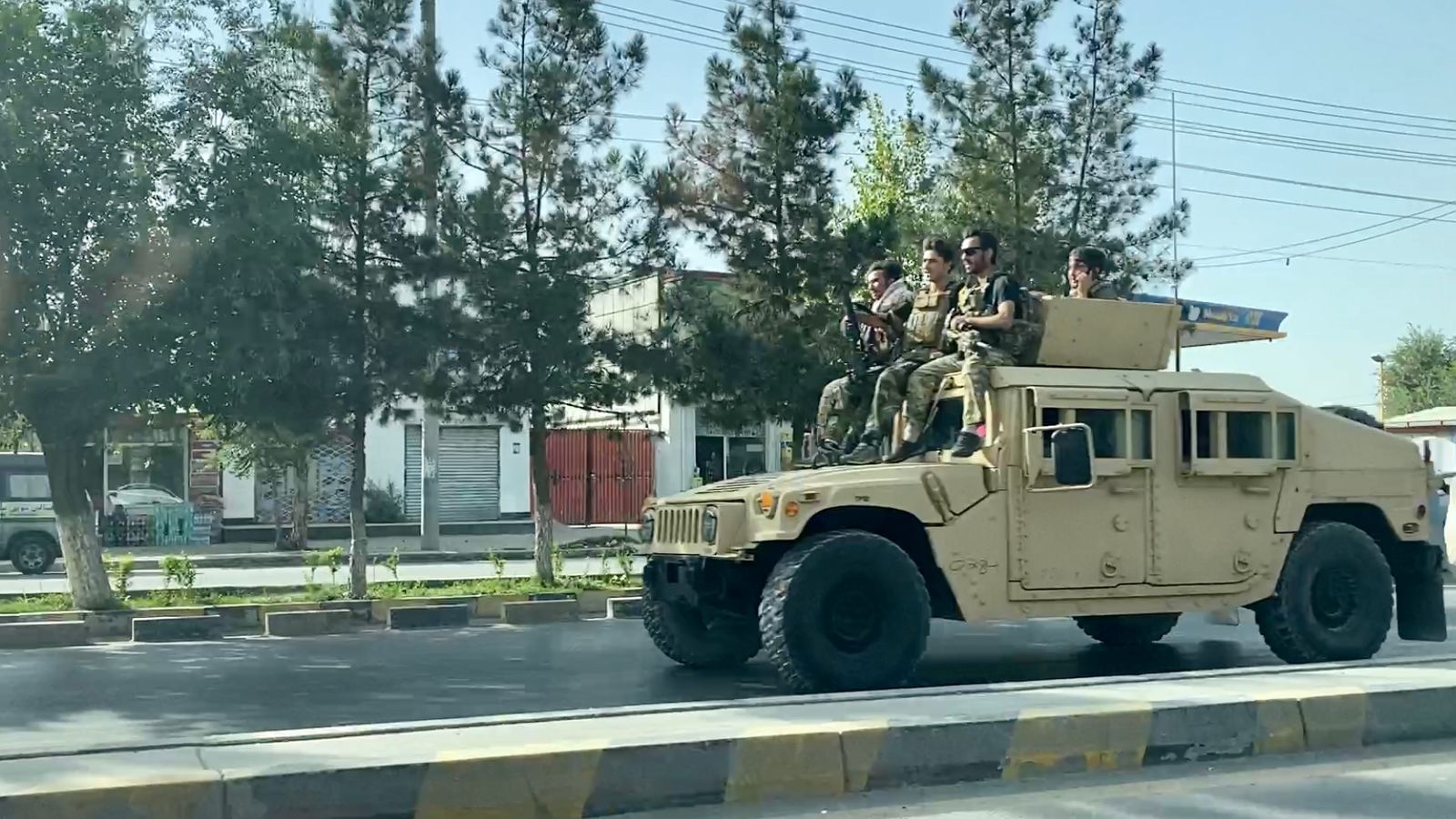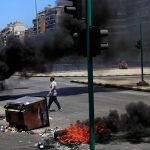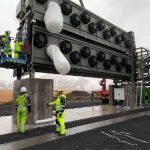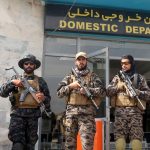Impressive looking Afghan army convoys rumble through the streets of Kabul.
Masked Afghan Special Forces soldiers, sitting high on their Humvees with their 50-calibre machine guns ready for action, glare down at the traffic below as they carve their way through intersections.
It is impressive, but recent events suggest it is a veneer, an illusion of power.
Please use Chrome browser for a more accessible video player
The military, trained and mentored by the British and American forces year after year, have capitulated.
The Taliban are no less of a rag-tag army as they ever were. But Afghanistan is falling to their advance by the hour.
The government here knows it, the American State department knows it, the Foreign Office knows it, and trust me: Kabul knows it.
Everyone is scared.
From a hillside outside the capital we look down on what is now the most important airport in the world.
With the Taliban advancing and all routes to the capital under their control, Hamid Karzai airport is the only way to get supplies in – and more importantly, it’s the only way out.
The American embassy that dominates the centre of town will move its operations to the airport, joining the US and British military. British embassy staff will follow suit.
Thousands of embassy staff, NGOs, and other foreign nationals will soon start their journey out of the Green Zone and the fortified mansions that have been home for two decades.
Passing Kabul residents who have no choice but to stay, they will travel the airport road, guarded by American and British soldiers, to the gates.
Finally inside, they’ll be processed and prepared for departure behind the blast walls and gun turrets of the airport complex.
Short of a rethink, this is the endgame.
Kabul is a city divided between those who can or may be able to leave, and those who are stuck.
Amongst them are tens of thousands of US special immigrant visa applicants who are hoping to be processed.
Please use Chrome browser for a more accessible video player
More than half of them are believed to be trapped outside of Kabul and unable to make it to the capital.
Many were trapped in cities like Kunduz and Lashkargah, which have already fallen to the Taliban. Their whereabouts are unknown.
So far, the United States has only processed just over 1200 applicants. The rest are frantically trying to get processed before it is too late.
Crowding around computers manned by experts, we meet groups of men struggling to fill out the application forms for Afghans who have worked for the international community.
Security guards, translators, a whole array of jobs.
These visas are their only passage to safety, but the process has been slow, and time is running out.
The US government’s handling of this now seemingly chaotic exit for citizens and Afghan allies has been widely criticised.
President Joe Biden was repeatedly warned in the months leading up to troop withdrawal that the process was taking too long, and that America’s allies were being abandoned to the Taliban – who will kill them.
Please use Chrome browser for a more accessible video player
Ali has worked as a special forces’ translator since 2011 and he still hasn’t got permission to travel.
“We served for American forces, we served for the US, and ISA forces, for the coalition forces, they have to take care [of] us, it is our turn to be helped,” he told me while waiting for his turn to finish his application.
“We helped them, we saved their lives, we were the people who communicated with two cultures, without interpreters they did nothing.”
He’s representative of so many who are so desperate.
“If the Taliban come to Kabul, they will forgive the Afghan forces, but they won’t forget the interpreters, the people who worked for the US government, because they will think we were informers, because when they got killed, you know, they blame us, because we were the eyes and ears of Americans.”
The vast majority of Afghans are slowly preparing themselves for the retaking of the city by the Taliban.
Those who can get out are leaving, others are preparing to return to a life under them – a life they thought they’d left behind for good.
Please use Chrome browser for a more accessible video player
On high ground in Kabul, we watch as the famous kite runners fly their kites.
The boys here are too young to know life outside of American and British troops. But the reality is, their parents know all too well their fun will quite literally be stopped – kite running under the Taliban is forbidden.
The outskirts of Logar province are only 37 miles from this hill I’m standing on overlooking the city.
The Taliban have taken the centre of Logar, it’s all but in their control now. They’re creeping closer every day.
As that day nears, the skies above Kabul reverberate to the sound of helicopters. They are the war machines of a war that now seems completely lost.






















